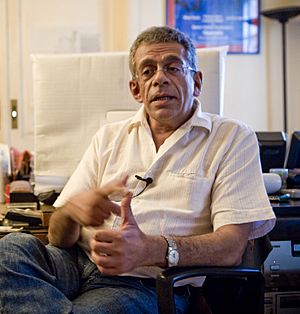Yousry Nasrallah facts for kids
Quick facts for kids
Yousry Nasrallah
|
|
|---|---|

Yousry Nasrallah in 2009.
|
|
| Born | 26 July 1952 Cairo, Egypt
|
| Nationality | |
| Alma mater | Cairo University Cairo Higher Institute of Cinema |
| Occupation | Film Director |
| Years active | 1978-present |
|
Notable work
|
After the Battle |
Yousry Nasrallah (born July 26, 1952) is a well-known Egyptian film director. He makes movies that often explore important social topics and tell stories about individuals.
Contents
Yousry Nasrallah's Early Life and Education
Nasrallah was born in Cairo, Egypt. His family belonged to the Coptic Christian faith. He grew up in Zamalek, a part of central Cairo. He studied economics and political science at Cairo University.
He chose to study these subjects because the film school he wanted to attend required a college degree. While at Cairo University, Nasrallah joined student groups. These groups worked for democracy and social change.
Starting His Film Career
Nasrallah finished university in 1978. He briefly enrolled in film school but found it boring. He felt it was too old-fashioned for his ideas. After that, he worked as a film critic and an assistant director. He worked in Beirut, Lebanon, from 1978 to 1982.
He wrote about movies for the Al-Safir newspaper. At the same time, he decided to step away from political groups. He wanted his art to be free and not controlled by any party. This freedom helped him create films that focused on individual stories. His movies often showed ideas about fairness and helping people.
He also became an assistant to Youssef Chahine, a famous Egyptian director. Chahine's company, Misr International, later produced Nasrallah's films. Nasrallah's movies often explore themes like social justice, different beliefs, and living away from home.
His 2012 film, After the Battle, was shown at the 2012 Cannes Film Festival. This is a very important film festival.
Yousry Nasrallah's Work in the Film Industry
Most of Yousry Nasrallah's films have received money from the French government. They were also produced by Misr International. This is the company of Youssef Chahine, who Nasrallah worked with earlier. Before making his own movies, Nasrallah also assisted other directors like Volker Schlöndorff and Omar Amiralay. The connections he made as an assistant were very helpful when he started directing his own films.
Many of Nasrallah's films are also made with a public TV channel called Arte. This channel, from France and Germany, often helps create independent movies. Nasrallah's films were more successful in Europe than in Egypt. They were shown in European cinemas and at film festivals. In Egypt, his films often struggled to find theaters. When they were shown, it was usually in special, non-commercial screenings for a short time.
Themes and Style in Nasrallah's Films
Nasrallah's films usually focus on the stories and experiences of individuals. This helped start a new wave of Egyptian movies in the early 2000s. These movies focused on single people rather than large groups. They showed stories that were separate from collective ideas.
Nasrallah's films often highlight people who are less privileged. They show the realities of different social classes. His movies tend to show the lives of people who are often overlooked in society.
Challenges and Important Works
As a Christian Egyptian, it was sometimes hard for Nasrallah to show religious topics in his films. This was especially true in the early 1990s. For example, in his 1993 film Mercedes, parts of the movie were cut in Saudi Arabia. All scenes showing Christianity were removed, making the film forty minutes shorter. Nasrallah's films also have a style that encourages the audience to form their own opinions about the characters.
One of Nasrallah's most important films is Scheherazade Tell Me A Story (2009). This film was his most successful at the box office. It was also fully funded by an Egyptian production company. Like many of his works, this movie is about people telling their own stories. This time, it focuses on women's lives, experiences, and issues. The film was praised by Egyptian newspapers for looking closely at society's issues. French reviewers also applauded it. The script for the film was adapted by Wahid Hamed from The Yacoubian Building (2002), a novel by Alaa Al Aswany. This film sold half a million tickets. It became Nasrallah's most successful movie and made him more confident about reaching larger audiences.
Filmography
- Sariqat Sayfiyya (Summer Thefts) (1985)
- Mercedes (1993)
- On Boys, Girls and the Veil (1995)
- El-Madina (The City) (1999)
- Bab el Chams (The Gate of Sun) (2003)
- Genenet al Asmak (The Aquarium) (2008)
- Ehki ya shahrazade (Scheherazade Tell Me a Story) (2009)
- After the Battle (2012)
- Brooks, Meadows and Lovely Faces (2016)
External links

